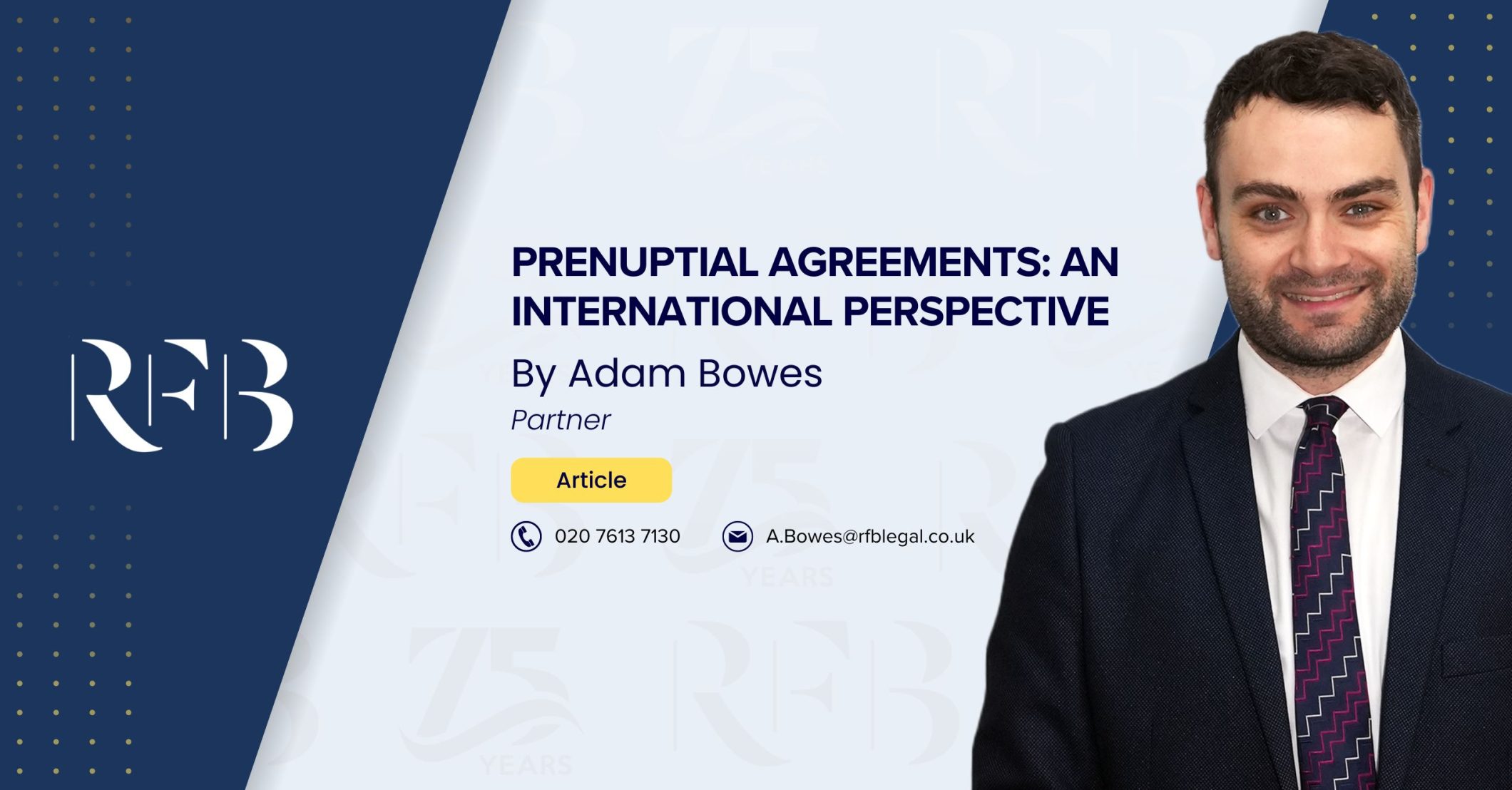At the outset, many people see a Prenuptial Agreement as a simple document signed in 2024 that will protect their assets in case of a divorce in 2050. Unfortunately, it is not that straightforward.
It is crucial for the parties involved to consider whether the Agreement will need a review in the future and, importantly, to assess its enforceability if they relocate from the UK to another jurisdiction. This could be for employment opportunities, family reasons, or simply to enjoy a better quality of life.
However, such a move can significantly alter the parties’ assets and needs. It is crucial to ensure that these potential changes are accounted for within the scope of a Prenuptial Agreement, which may have been drafted many years earlier.
In England, Prenuptial Agreements are not automatically legally binding. However, if certain safeguarding provisions are met, they are likely to be upheld.
Is it Easy to Enforce an International Prenuptial Agreement?
Potential parties often wonder if a ‘global agreement’ can be drafted and enforced worldwide. Sadly, this is not feasible.
The primary reason is the varying matrimonial and property laws across different countries.
In the USA, for example, matrimonial law differs from state to state. What is legal in New York may be significantly different from what is legal in California.
Translating a couple’s intentions with a Prenuptial Agreement across jurisdictions can be complex and exceptionally tricky. For instance, if a Russian citizen marries a Chinese citizen residing in London, both with assets in their home countries, it is crucial to consider the Agreement’s effect in Russia and China where the assets are held.
Increasingly, families are becoming international, especially in cosmopolitan cities like London, and hold assets in multiple jurisdictions, making the drafting of a Prenuptial Agreement more challenging. While European matrimonial property regimes are well established and routinely enforced, the situation in England is more nuanced, with the court ultimately retaining discretion.
This complexity highlights the challenge of having a Prenuptial Agreement upheld in the relevant country where the parties seek to resolve their marriage dissolution. It is impossible to initially specify all future jurisdictions where international parties may reside over time.
In England, a Prenuptial Agreement cannot bind the court’s jurisdiction. However, the family courts of England and Wales are likely to uphold an agreement considered fair.
International Prenuptial Agreements: What Considerations Should be Made?
Typically, an agreement is considered fair if:
- Both parties have received independent legal advice (ILA) from solicitors;
- Both parties have made full financial disclosure;
- The terms of the Agreement are fair and provide for both parties’ needs in case of a marriage dissolution;
- There was no undue pressure on either party to sign the Agreement;
- There was no fraud or misrepresentation; and
- The agreement is properly executed as a deed.
While these considerations are factors that the court will take into account in the event of a dispute upon divorce, failure to comply with one or more of them will not necessarily be fatal. Each case is considered individually.
For example, in the case of Versteegh v Versteegh [2018] EWCA 1050, the Court of Appeal determined that if a Prenuptial Agreement is drafted in a jurisdiction where such Agreements are routine and generally finalised without legal advice and full financial disclosure, the court should not expect both parties to seek such advice in each jurisdiction individually.
In the more recent case of CMX v EJX [2022] EWFC 136, the family court considered a French separation de biens agreement (a separate property regime). The wife claimed she did not fully understand the Agreement and had not received ILA or full financial disclosure from the husband. The husband counter-argued that a notary had explained the Agreement to both of them, and this was typical in France. The Agreement would be upheld in France and the English Court would not simply disregard it as this was based on the French way of working rather than what was expected under said English agreements.
Conversely, in AH v PH [2013] EWHC 3873, the court found that the wife did not fully understand the implications of a Prenuptial Agreement drafted in Scandinavia, and thus, she should not be held to it. At the time, the parties were residing in England and did not seek English ILA on the agreement.
A key consideration when preparing a Prenuptial Agreement is determining which jurisdiction will govern the Agreement. Ideally, the Agreement should be drafted to comply with the rules of the country with which the couple has the strongest ties. For example, if a couple has properties/assets in America but primarily resides in the UK, the Agreement should be drafted in England. This is subjective and depends on various factors, such as where each party is domiciled, where they intend to reside, and where the primary assets are located (this could be the most valuable and/or the most in quantity).
If more than one jurisdiction is involved, it may be advisable to have a mirror Agreement in the other jurisdiction(s). This Agreement would contain the same terms as the one drafted in England but would be signed in the foreign jurisdiction to maximise the chances of enforcement in both places. This requires legal advice from both jurisdictions and collaboration between lawyers to understand the differences in laws, as an English lawyer cannot draft a compliant Agreement for a foreign jurisdiction unless they are also a recognised professional there.
There are also practical considerations which may need to be reflected upon. For instance, while a same-sex couple can enter into a Prenuptial Agreement in England, some countries do not recognise same-sex marriages and would not uphold an Agreement drafted under English law.
International Prenuptial Agreement Solicitors – Contact Us
If you are considering entering into a Prenuptial Agreement, seek independent legal advice (ILA) as early as possible. If there is an international element to protecting assets, it may be necessary to appoint a lawyer in that jurisdiction to advise on the applicable regime and the enforceability of the Agreement in case of a future dispute.
For further information and advice, please contact Adam Bowes, Partner and Head of the Family Department, at a.bowes@rfblegal.co.uk or call 0207 613 7130.



